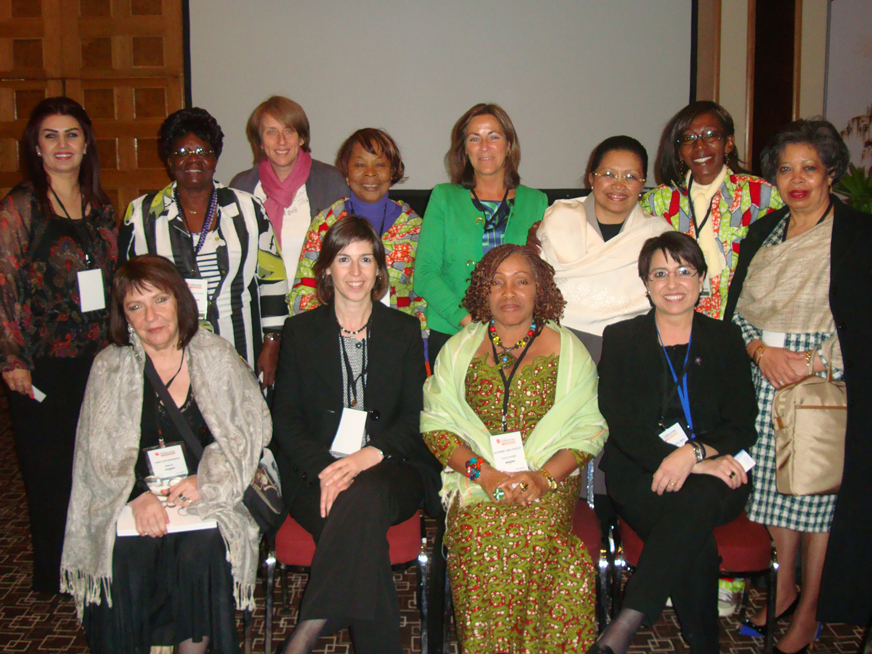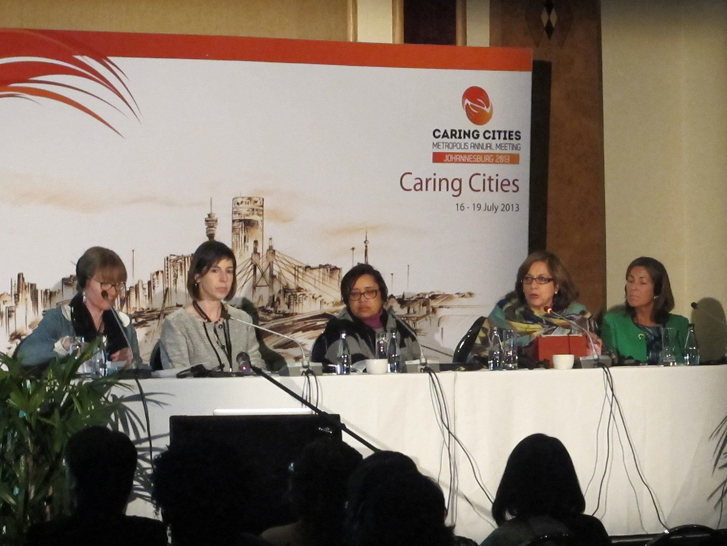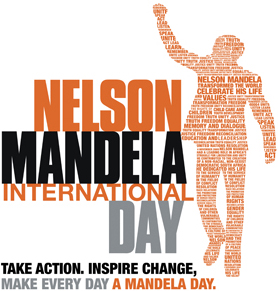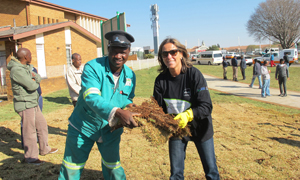Caring cities. Annual meetings of Metropolis and the GlobalFund for Cities Development (FMDV) in Johannesburg

Anne Claes and Sophie Willaumez at the meeting of the Women’s Network of Metropolis.

Working session during the annual meeting of Metropolis on the topic of Caring Cities.
 The Brussels-Capital Region took part in the annual meetings of Metropolis and the Global Fund for Cities Development from 16 to 19 July in Johannesburg. The meetings respectively focussed on the quality of life of urban dwellers and innovative solutions for tackling the local, resilient and sustainable development of cities.
The “caring cities” place citizens at the centre of society, with a view to ensuring a better quality of life to all the inhabitants. This concept poses a real challenge for local officials as they try to devise the right response for providing essential services, for the spatial organisation of their communities and for developing an economy that is capable of significantly contributing to the funding of local development.
More than 400 representatives from 99 cities and metropolitan areas discussed and exchanged views during six workshops which focused on food security, the agile city in developing countries, the power of the informal economy, the resilience of cities, the commitment of citizens and social cohesion. These six topics, which represent only a few of the aspects of the caring cities, allowed participants to develop the principle of the caring city even further.
Local, resilient and sustainable development
The annual meeting of the FMDV gave rise to a better understanding of the global REsolutions programme, which was launched by Metropolis and implemented by the FMDV. REsolutions, which lasts four years, invites all metropolitan stakeholders to “REthink economic solutions” as an incentive for local, resilient and sustained development.
REsolutions aims to identify, analyse, transfer and implement pilot economic and financial strategies and mechanisms which improved the impact and performance of sustainable local development policies. The goal is to provide the local authorities with complementary toolkit which allows for a hybridisation of the financial resources and an endogenous regional development.
The results obtained by REsolutions should enhance the local authorities’ role as the engine of their own economic development in the wider debate on the Post-2015 Development Agenda, which establishes a framework for the Post-Rio+20 Sustainable Development Goals. In addition, the programme also raises the question of how to fund urban development and aims to encourage cities to put together their own agenda against the wider development debate, which will culminate in the Summit of Cities, to be organised in 2016, in the margin of the United Nations Habitat III Conference.
The Brussels Community Land Trust as an example
The creation in early 2013 of a Community Land Trust (CLT) by the Brussels-Capital Region was briefly touched upon during the Johannesburg meeting. It will be presented in more detail during a conference entitled “Financer les collectivités territoriales à l’ère des crises” (Funding community land in an era of crises) to be held in Paris at the end of January 2014.
The CLT is a non-profit structure which acquires and manages land. Its aim is to renovate or build real estate on this land to allow low-income families to become home owners, while also focussing on establishing shared activities which are open to the local residents.
The CLT’s key principle is simple: to separate the cost of the land from the cost of the bricks. The CLT owns the land and sells the buildings to the families that will live there. Given that the land value no longer is included in the building’s value it is much cheaper than it would ever be on the conventional housing market
The land remains the property of the CLT in perpetuity but the real estate passes into the hands of the families. If the property is resold the owner of the property will receive the value of his initial purchase and a share of the profits made from the sale. The capital which is thus raised should enable the home owner to buy another house.
The CLT thus is the freeholder. The subsidies received by the first household are repaid to the CLT which can then help other families buy a house. The regional resources that are invested are thus reinvested to allow other families to become home owners. In other terms, the Region’s boost in effect is a “return”.
In order to ensure that the project is collective, participatory and involves the neighbourhood the CLT has also chosen a democratic and innovative approach to governance. Two thirds of its decision-making bodies are composed of locals and representatives of local associations or local stakeholders. The remaining third is made up of the authorities, which fund the CLT.
By explaining a local initiative that was implemented in the Brussels-Capital Region and which is innovative in Europe we want to share and exchange institutional and local funding strategies and mechanisms that were developed by a region’s stakeholders with other cities in order to cope with change and build more inclusive and autonomous cities.
The Brussels-Capital Region took part in the annual meetings of Metropolis and the Global Fund for Cities Development from 16 to 19 July in Johannesburg. The meetings respectively focussed on the quality of life of urban dwellers and innovative solutions for tackling the local, resilient and sustainable development of cities.
The “caring cities” place citizens at the centre of society, with a view to ensuring a better quality of life to all the inhabitants. This concept poses a real challenge for local officials as they try to devise the right response for providing essential services, for the spatial organisation of their communities and for developing an economy that is capable of significantly contributing to the funding of local development.
More than 400 representatives from 99 cities and metropolitan areas discussed and exchanged views during six workshops which focused on food security, the agile city in developing countries, the power of the informal economy, the resilience of cities, the commitment of citizens and social cohesion. These six topics, which represent only a few of the aspects of the caring cities, allowed participants to develop the principle of the caring city even further.
Local, resilient and sustainable development
The annual meeting of the FMDV gave rise to a better understanding of the global REsolutions programme, which was launched by Metropolis and implemented by the FMDV. REsolutions, which lasts four years, invites all metropolitan stakeholders to “REthink economic solutions” as an incentive for local, resilient and sustained development.
REsolutions aims to identify, analyse, transfer and implement pilot economic and financial strategies and mechanisms which improved the impact and performance of sustainable local development policies. The goal is to provide the local authorities with complementary toolkit which allows for a hybridisation of the financial resources and an endogenous regional development.
The results obtained by REsolutions should enhance the local authorities’ role as the engine of their own economic development in the wider debate on the Post-2015 Development Agenda, which establishes a framework for the Post-Rio+20 Sustainable Development Goals. In addition, the programme also raises the question of how to fund urban development and aims to encourage cities to put together their own agenda against the wider development debate, which will culminate in the Summit of Cities, to be organised in 2016, in the margin of the United Nations Habitat III Conference.
The Brussels Community Land Trust as an example
The creation in early 2013 of a Community Land Trust (CLT) by the Brussels-Capital Region was briefly touched upon during the Johannesburg meeting. It will be presented in more detail during a conference entitled “Financer les collectivités territoriales à l’ère des crises” (Funding community land in an era of crises) to be held in Paris at the end of January 2014.
The CLT is a non-profit structure which acquires and manages land. Its aim is to renovate or build real estate on this land to allow low-income families to become home owners, while also focussing on establishing shared activities which are open to the local residents.
The CLT’s key principle is simple: to separate the cost of the land from the cost of the bricks. The CLT owns the land and sells the buildings to the families that will live there. Given that the land value no longer is included in the building’s value it is much cheaper than it would ever be on the conventional housing market
The land remains the property of the CLT in perpetuity but the real estate passes into the hands of the families. If the property is resold the owner of the property will receive the value of his initial purchase and a share of the profits made from the sale. The capital which is thus raised should enable the home owner to buy another house.
The CLT thus is the freeholder. The subsidies received by the first household are repaid to the CLT which can then help other families buy a house. The regional resources that are invested are thus reinvested to allow other families to become home owners. In other terms, the Region’s boost in effect is a “return”.
In order to ensure that the project is collective, participatory and involves the neighbourhood the CLT has also chosen a democratic and innovative approach to governance. Two thirds of its decision-making bodies are composed of locals and representatives of local associations or local stakeholders. The remaining third is made up of the authorities, which fund the CLT.
By explaining a local initiative that was implemented in the Brussels-Capital Region and which is innovative in Europe we want to share and exchange institutional and local funding strategies and mechanisms that were developed by a region’s stakeholders with other cities in order to cope with change and build more inclusive and autonomous cities.
 Participation in Mandela Day
In the margin of these annual meetings the participants also took part in the Mandela Day festivities. Every year South Africans celebrate Mandela Day on 18 July. The day is devoted to charitable activities as a tribute to the years of militancy of the hero of the anti-Apartheid struggle. More specifically each South African is invited to personally spend 67 minutes of his day doing something constructive for the community. This highly symbolic figure corresponds with the 67 years of political militancy of the Nobel Prize laureate, who spent about 30 years of his life behind bars. In view of “Madiba”’s health the 2013 Mandela Day was particularly emotional.
Participation in Mandela Day
In the margin of these annual meetings the participants also took part in the Mandela Day festivities. Every year South Africans celebrate Mandela Day on 18 July. The day is devoted to charitable activities as a tribute to the years of militancy of the hero of the anti-Apartheid struggle. More specifically each South African is invited to personally spend 67 minutes of his day doing something constructive for the community. This highly symbolic figure corresponds with the 67 years of political militancy of the Nobel Prize laureate, who spent about 30 years of his life behind bars. In view of “Madiba”’s health the 2013 Mandela Day was particularly emotional.



